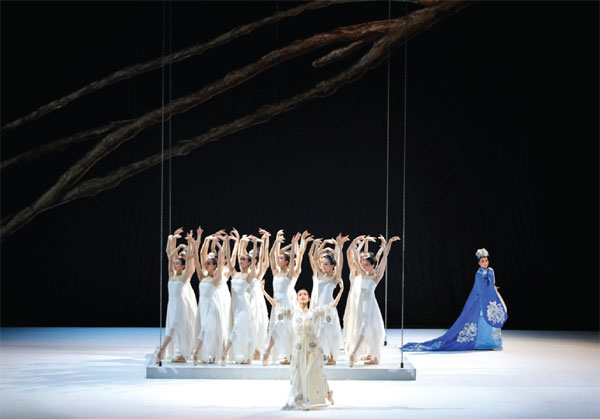Peony Pavilion plays in park setting
National Ballet of China performs classic at Wolf Trap Foundation for the Performing Arts
The National Ballet of China performed The Peony Pavilion outdoors on Tuesday evening outside Washington.
The performance was held at the Wolf Trap Foundation for the Performing Arts in Vienna, Virginia, an amphitheater designed to be in harmony with its national park setting.
"I expected to see beautiful costumes, gorgeous dancing, and hear beautiful music, and I have experienced all those things," said audience member Melissa Labutta.
Written in 1598 during the Ming Dynasty, The Peony Pavilion is a traditional Kunqu Opera classic.
"The show is very colorful and creative," said David, who had an orchestra level seat.
The Peony Pavilion is an adaptation of a famous Chinese love story. A noblewoman falls asleep in her family's garden, and in her dreams, falls in love with a handsome young man. She cannot find him in the waking world, and then she dies of a broken heart. She appears to him as a ghost, and then gets brought back from the dead.
"It exceeded my expectations, and it is just gorgeous," Labutta said of the show. She said she had a friend who has taught in China and told her of how dramatic the performance would be.
"I was prepared for that, and I thought the drama made it very beautiful," she said.
Jesika Floyd, who drove one hour to see the performance, said she found it a "bit abstract but still exquisite.
"I love the tapestry, the colors, and the flow of the whole entire performance," she said.
The National Ballet of China was founded in 1959, and is known for its integration of Chinese traditional culture and Western ballet. It has more than 100 ballets in its repertoire, including Swan Lake and The Red Detachment of Women.
The ballet performs under the motto "United, Pragmatic, Independent, and Enterprising".
Liu Jingyang and Zhang Andi contributed to this story.
|
The Peony Pavilion, a romance based on a 400-year-old epic masterpiece of Kunqu opera, has been adapted into ballet by the National Ballet of China. On Tuesday evening, the ballet performed at the Wolf Trap Foundation for the Performing Arts. As one of the most famous love stories in the Chinese canon, The Peony Pavilion was written as an opera by Tang Xianzu in 1598, the same year as Shakespeare's Romeo and Juliet, with which it is often compared. Provided to China Daily |



















